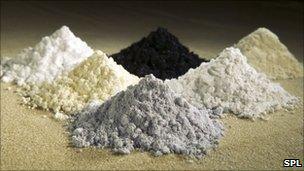China pledges not to use rare earth minerals as weapon
- Published

Rare earth metals come from China - they are vital for production of a range of electronic items
China has said it will not use exports of so-called rare earth minerals as a diplomatic bargaining tool.
The country produces more than 90% of these valuable commodities, which are used to produce electronic items such as mobile phones.
A row has blown up surrounding their availability, with relations between China and Japan at its centre.
The US and the EU asked Beijing to clarify its policy on mineral exports after China stopped shipping to Japan.
The stoppage followed a spat between China and Japan last month over islands whose ownership is disputed.
A spokesman for China's Ministry of Industry and Information Technology, Zhu Hongren, said: "China will not use rare earths as a bargaining tool. We will have cooperation with other countries in the use of rare earths, because it is a non-renewable energy resource."
But Mr Zhu did not answer a reporter's question about when normal exports of rare earth minerals would resume.
China has about 30% of rare earth mineral deposits, but accounts for about 97% of production.
Meanwhile, US Secretary of State Hillary Clinton has called on China to clarify its policy on rare earth resources.
She said recent Chinese restrictions served as a "wake-up call" for the industrialised world which should drive it to look for other suppliers.
Rare earth metals are scarce minerals that have particular properties, such as being magnetic or shining in low light.
This makes them particularly useful in some new technologies, such as solar panels or electric cars or light-weight batteries.
Japanese companies say Beijing has blocked rare earth shipments to Japan since 21 September after a Chinese fishing boat captain was detained near disputed islands.
- Published28 October 2010
- Published27 October 2010
- Published20 October 2010